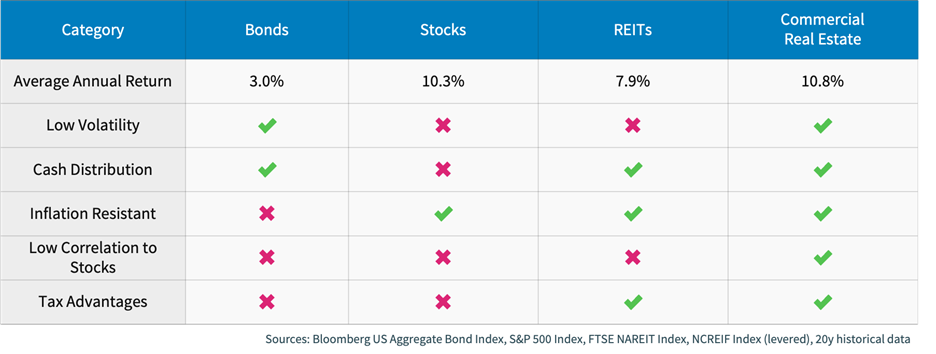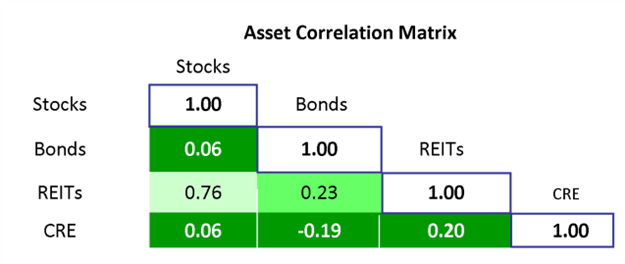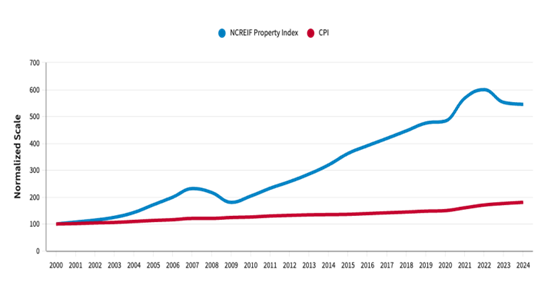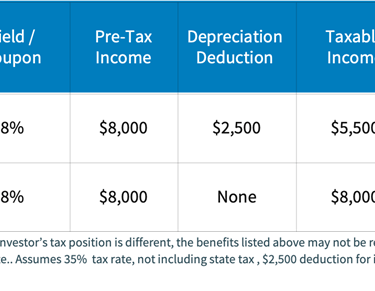
Why Consider Commercial Real Estate Investing?
Benefits of investing in private commercial real estate.
REAL ESTATEBLOCKCHAIN
9/11/20253 min read
Key Benefits
Strong Return Potential
Private commercial real estate has historically delivered compelling long-term total returns and favorable risk-adjusted performance compared to equities and bonds.
Consistent Income Generation
Over the past 20 years, private commercial real estate has provided higher average income returns than both US bonds and equities.
Additional Advantages
Investing in private real estate can offer diversification, act as a hedge against inflation, and provide potential tax benefits.
Understanding Private Commercial Real Estate
Private commercial real estate refers to properties that are not publicly traded on stock exchanges but are owned by individuals, investment firms, or partnerships. These assets generate income primarily through leasing space to tenants and include several key sectors:
Multifamily and Apartment Buildings – Residential complexes with multiple rental units, offering steady occupancy and rental income.
Industrial Properties – Warehouses, distribution centers, and manufacturing facilities, benefiting from the rise of e-commerce and global supply chains.
Self-Storage Facilities – Secure storage units for personal and business use, providing high occupancy rates and low operating costs.
Data Centers – Facilities housing critical IT infrastructure, benefiting from the growing demand for cloud computing and digital services.
Office Buildings – Corporate and professional spaces leased to businesses, providing stable tenancy and long-term rental agreements.
Retail and Specialty Properties – Shopping centers, medical offices, hotels, and niche assets catering to specific markets.
How Commercial Real Estate Creates Long-Term Financial Security
Investing in commercial real estate is a time-tested strategy for building long-term wealth. These properties provide investors with dual benefits—steady rental income and value appreciation over time. Unlike stocks and public REITs that can be influenced by daily market swings, private commercial real estate offers stability and tangible ownership. Savvy investors use this asset class to create lasting financial security and wealth accumulation.
Comparing Asset Classes
Commercial Real Estate has consistently delivered high returns, low volatility, steady income, inflation protection, portfolio diversification, and tax advantages relative to Bonds, Stocks and REITs.


Less Volatility, More Predictability
Public markets can be unpredictable, with price swings driven by economic news and investor sentiment. In contrast, commercial real estate moves at a steadier pace, offering a layer of security for investors who prefer a long-term approach. With properties secured by tenants through multi-year leases, investors can enjoy a more predictable return profile.
Over the past 20 years, private commercial real estate has delivered a higher risk-adjusted return than stocks, bonds and publicly traded REITs. This is because its historical total returns are more comparable equities, while its return fluctuations over time—measured by standard deviation have been closer to those of bonds.


Strengthening a Portfolio with Real Estate
A well-rounded portfolio benefits from assets that respond differently to economic cycles. Commercial real estate (CRE) exhibits low correlation with stocks (0.06), bonds (-0.19), and REITs (0.20), meaning its value tends to move independently of these assets, which helps investors reduce overall portfolio risk, smooth out returns, and protect against market downturns.


A Natural Inflation Hedge
Real estate tends to perform well during inflationary periods because property values and rental income often rise alongside the cost of living. This makes commercial properties an attractive option for investors looking to preserve purchasing power.


A Dependable Income Stream
One of the biggest appeals of commercial real estate is its ability to generate income. Tenants, ranging from retail businesses to corporations, typically sign long-term leases, providing investors with a consistent revenue stream.
Tax Benefits That Add Value
Investing in private commercial real estate can offer unique tax advantages that enhance overall returns. Depreciation deductions allow investors to reduce taxable income, while long-term capital gains on property sales are often taxed at lower rates than regular income, making real estate an efficient investment from a tax perspective. In the below example, a bond investor would need a pre-tax yield of 9.35% to achieve the same after-tax return as an 8% yielding commercial real estate investment.*


The Takeaway
Commercial real estate offers a compelling mix of income, appreciation, and risk management, making it a valuable addition to a well-balanced investment strategy. By providing stable returns, inflation protection, and tax advantages, it presents a solid opportunity for investors looking to build and preserve wealth over time.
Contact
American Digital Realty LLC,
100 Center Avenue Wilmington, DE 19807
Socials
Copyright © 2026 American Digital Realty
American Digital Realty and its affiliates (collectively, “American Digital Realty”) operate a website at AmericanDigitalRealty.com. No communication by American Digital Realty through this website or any other medium should be construed or intended as a recommendation to purchase, sell, or hold any securities, nor as investment, tax, financial, accounting, legal, regulatory, or compliance advice. Nothing on this website constitutes an offer to extend credit, an offer to purchase or sell securities, or a solicitation of any securities transaction. You are encouraged to consult with licensed legal professionals and investment advisors for any legal, tax, insurance, or investment-related guidance.
Offering pursuant to Reg D, Rule 506(c). Securities are offered only to accredited investors after verification. Not registered with the SEC. American Digital Realty LLC is an Exempt Reporting Adviser (ERA) under the Investment Advisers Act. It is not a fully registered investment adviser. ERA managers remain subject to SEC oversight and anti-fraud rules.
*Target returns are targets only. There can be no assurance the Fund will achieve these objectives; actual results may be materially different, including loss of capital. Past performance of real estate or other asset classes is not indicative of future results. Liquidity is not guaranteed; investors should be prepared to hold long term. Target returns are net of the Fund’s fees and underlying managers’ fees.
By using the American Digital Realty website, you accept our Terms of Service and Privacy Policy. While we strive to use reliable third-party data, we cannot guarantee the accuracy or completeness of information provided by investors or other external sources.
Legal
